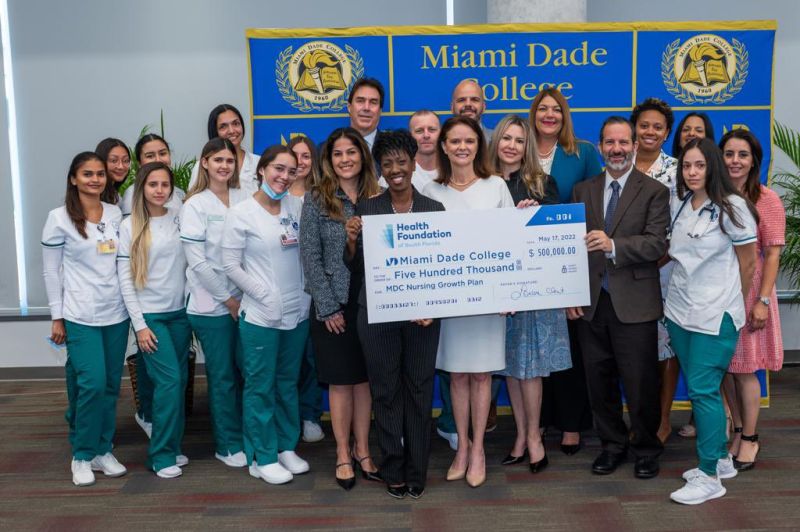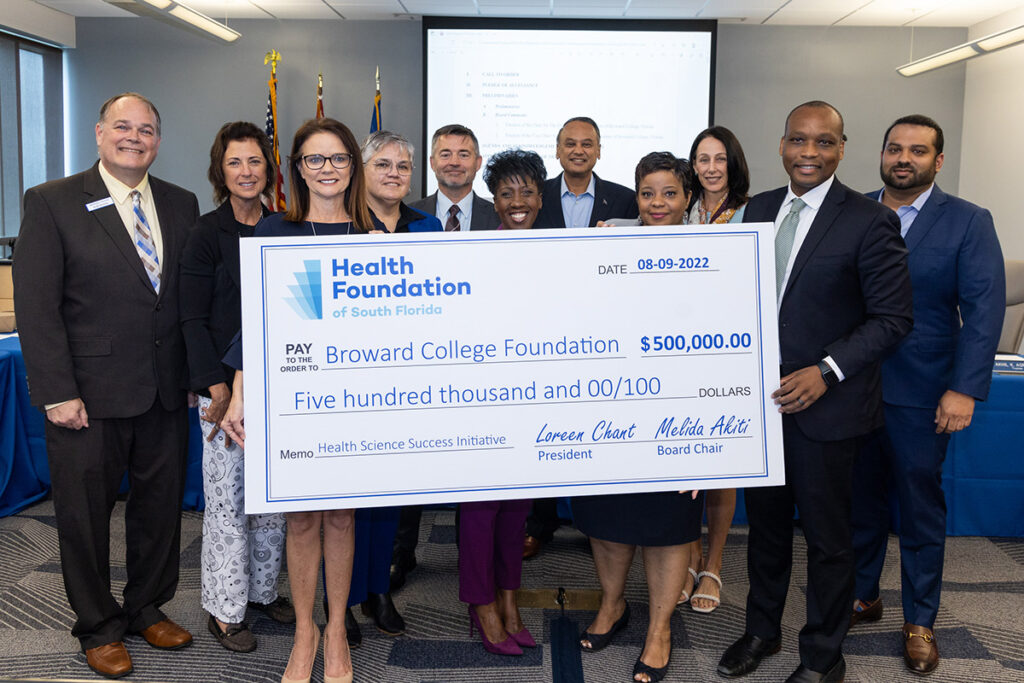Health Foundation of South Florida invests $1 million to address region’s nursing and healthcare workforce shortage
Grants to Miami Dade College and Broward College will be used to fund enrollment, retention, student success programs and initiatives to help connect graduates to healthcare jobs
As the nationwide nursing shortage persists, the Health Foundation of South Florida, the region’s largest philanthropic organization focused on achieving health equity in underserved communities, announced a $1 million investment to fund expanded enrollment, scholarships and other support services for nursing and health sciences students at two local public colleges—Miami Dade College and Broward College.
With the funding, the Health Foundation not only seeks to bolster South Florida’s nursing and allied healthcare workforce (which includes medical assistants and techs as well as licensed practical nurses, for example) but also increase access to well-paying, in-demand jobs for students from the region’s underserved, Black and Hispanic communities.
“We understand there are no quick or simple solutions to our region’s shortage of nursing and healthcare workers. But we also believe the crisis presents an opportunity for us to help pave the way to good, steady, well-paying jobs for more people in our community,” said Loreen Chant, CEO of the Health Foundation of South Florida. “We care about this deeply because we know that improving the health and well-being of our region is impossible without making economic opportunity and mobility more accessible.”
The grants will be used by both colleges to attract more minority, first-generation and low-income students to their respective health sciences and nursing programs. They will offer scholarships and create retention and support initiatives to help ensure the students graduate successfully and are ultimately connected to health system jobs. Many students who enroll face significant challenges, such as family responsibilities, financial obligations and other structural or motivational barriers that often impede them from completing certificate or degree programs.

Miami Dade College—which received a $500,000 grant from the Health Foundation that was matched by an additional $500,000 from the Mitchell Wolfson Family Foundation—will use the funds to expand its recently launched certification program for licensed practical nurses, or LPN’s. In addition, they will use the grant to increase the number of students earning two-year Associate Degrees in nursing and to provide scholarships, extra academic prep classes and workshops for students in need.

Broward College, which also received a $500,000 grant, will use the funds to launch an initiative to support health sciences students who have unmet personal and economic needs. The college plans to hire two full-time “retention specialists” whose jobs it will be help vulnerable students access the support they need so they can graduate successfully. The school also plans to leverage the Health Foundation’s grant to secure an additional $700,000 to fund the efforts.
Helping more nursing and health sciences students graduate has never been more urgent. A recent report by the Florida Hospital Association and Safety Net Hospital Alliance of Florida identified just how steep the healthcare workforce shortage is. By 2023, the report projects there will be about 244,000 registered nurses across the state of Florida—but the state will actually need 268,000. And by 2035, that gap is expected to widen, with a need for 323,000 and only 286,000 projected to be available.
By focusing on students from underserved, minority communities, the funding can also pave the way for them to access economic prosperity, which is linked to good health, life expectancy and overall quality of life.
In addition, such initiatives can contribute to making the region’s healthcare workforce pipeline more diverse and reflective of South Florida’s communities. Studies have shown nurses and other health professionals from different racial and ethnic backgrounds help to increase trust in the entire medical system, encouraging more people to utilize healthcare resources and improving access to care and positive health outcomes in vulnerable populations.
“We are happy to partner with the Health Foundation of South Florida to serve underserved and underrepresented populations in South Florida,” said Bryan Stewart, Miami Dade College, Medical Campus President. “This grant will allow us to support students beginning their careers in health programs as well our current nursing students, and it will help us create boot camps for new students. I believe this is an innovative and extremely important partnership.”
“This is a pivotal time when our community needs healthcare workers the most and it is also a time when our students face the most personal obstacles in completing degrees in health sciences,” said Sara Turpel, Dean and Nursing Administrator for Nursing at Broward College. “This gift from the Health Foundation of South Florida will positively impact students through increased educational attainment and have a direct impact on the health of the community.”
The Health Foundation’s $1 million investment falls under one of its key strategic goals: to help foster a thriving community by improving the social and economic conditions that promote physical, mental and emotional well-being. It is also part of the Foundation’s work with the South Florida Anchor Alliance, a collaborative of 19 regional institutions—including various healthcare systems—that have banded together with a mission to create a more inclusive South Florida economy through collective workforce development and procurement efforts.
_____
ABOUT THE BENJAMIN LEON SCHOOL OF NURSING AT MIAMI DADE COLLEGE
More than 50 years ago, Miami Dade College created a nursing program to meet the rapidly growing need for registered nurses in Miami-Dade County. Today, the school has graduated nearly 20,000 nurses. Alumni of the Benjamin León School of Nursing are working in every hospital and most of the outpatient facilities in the region and represent a large percentage of Hispanic nurses nationally. Many have gone on to receive BSN, MSN, DNP and/or PhD degrees. Several of the 69 current faculty members are also proud graduates of the program. The school is proud to offer full-time, part-time and online opportunities both for students who aspire to be registered nurses and for RNs who wish to earn a BSN. Proud of its diverse faculty and students, the school excels at helping students achieve their dreams. Learn more at https://www.mdc.edu/nursing.
Serving more than 63,000 students annually, Broward College provides residents with certificate programs, two-year university-transfer degrees, two-year career degrees and baccalaureate degrees in selected programs. The mission of the College is to provide high-quality educational programs and services that are affordable and accessible to a diverse community of learners. For more information, visit www.broward.edu.
Recent Comments